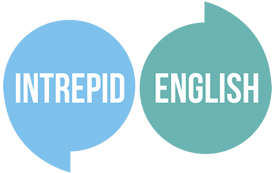Phrasal verbs are the combination of a verb followed by a preposition and/or a particle. An example of a verb is ‘look‘. An example of a particle is ‘up‘. By combining these words together, a new meaning is created which is different from the meaning of the words individually. The phrasal verb ‘look up‘ has a different meaning to the individual words ‘look‘ and ‘up‘. You might look a word ‘up’ in a dictionary; this is a figurative meaning, because you are not literally looking up⬆️
Another example is the verb ‘run‘ + the preposition ‘up‘ = ‘run up‘.
- Last night, we ‘ran up‘ a huge bill in the restaurant!
By adding another preposition, another phrasal verb is created with a new meaning: ‘run up against‘
- This activity will take longer than we first thought as we have ‘run up against‘ some problems.
How many phrasal verbs can you think of containing the preposition ‘up‘? Do you have a favourite way to ‘pick up‘ phrasal verbs? Do you make a note when they ‘come up‘ in conversation or do you like to ‘speed up‘ the learning process by ‘reading up‘ on this grammar in a textbook or looking it up online?
We’ve ‘dished up‘ this list to help you ‘brush up‘ your knowledge of some of the most common ‘up‘ phrasal verbs. Take the quiz at the end of the blog to test your understanding.
Did you notice how many phrasal verbs with ‘up‘ I just used in the last few sentences?
1. Brighten up
This phrasal verb describes a lightening in the weather, or in a person’s mood. It could also refer to the process of improving something, like repainting an old, peeling wall.
- You won’t need to take your coat and umbrella, it’s beginning to ‘brighten up‘ outside.
- Sarah has just bought several tins of paint; she’s going to ‘brighten up‘ the old garden shed.
2. Speed up
‘Speed up‘ describes the process of making something faster.
- We need to ask the driver to ‘speed up‘ if we want to get to the airport in time.
- The project is falling behind schedule. Let’s ‘speed up‘ the testing phase to get back on track.
3. Back up
This phrasal verb has many different meanings. However, ‘back up‘ is most commonly related to reversing something, such as a car.
You could ‘back up‘, or create a copy of, important data to ensure at least one copy remains available if the original is destroyed.
- Please ‘back up‘ your car as it is blocking the driveway.
- I recommend ‘backing up‘ all of your data in case your hard drive crashes.
4. Save up
We use this phrasal verb to describe accumulating money, usually to make a large purchase in future.
- Joe has been ‘saving up‘ for more than a year to buy his dream house.
- I can’t come to the party this weekend because I’m ‘saving up‘ for a new car.
5. Hold up
Here’s another phrasal verb with many uses. ‘Hold up‘ could describe a situation in which someone is prevented from doing what they want. You could use ‘hold up‘ to talk about fulfilling your part of an agreement. It is also used to describe a crime involving a gun.
- I’m sorry I’m late, I was ‘held up‘ in traffic.
- They ‘held up‘ their end of the deal, so we have to ‘hold up‘ ours.
- Two gunmen ‘held up‘ the Central Bank this morning.
Phrasal Verbs with “UP” Exercise:
Now it’s your turn. Fill in the gaps in the sentences below with the correct form of the phrasal verbs from this blog post.
1. My computer crashed last week and I lost my files. I must remember to __________ my hard drive in future.
2. Let’s __________ this room with some white paint and a new sofa.
3. The train was __________ due to ice on the track.
4. I’ve hardly got any work done today. I was ____________ in meetings all afternoon.
Would you like to learn phrasal verbs the easy way?
Download a copy of our free Figure Out Phrasal Verbs Ebook
